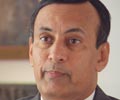A closer look at these militants who have come out of the tribal areas and are moving east into the rest of Pakistan.
- People
- Steve Coll
- Dexter Filkins
- Henry Crumpton
- Husain Haqqani
- Related Links
- The Region's New Fighters
A rare interview with the head of the Pakistani Taliban in South Waziristan and profiles of several other militants, from FRONTLINE's 2006 report Return of the Taliban. - Baitullah Mehsud
A bio and roundup of articles on Waziristan's Taliban commander from The New York Times. - Profile: Baitullah Mehsud
Mehsud granted an exclusive phone interview to the BBC in 2007. Also view photographs of his tribal stronghold in South Waziristan. (Dec. 28, 2007) - Next-Gen Taliban
In the wake of Benazir Bhutto's assassination, Nicholas Schmidle reported on the Pakistani Taliban. (The New York Times, Jan. 6, 2008) - Militants Escape Control of Pakistan, Officials Say
Also after Bhutto's death, The New York Times detailed Pakistani intelligence officials' concerns that they had lost control of the militants they had nurtured since the 1980s. (Jan. 15, 2008)
Steve Coll The New Yorker; author, Ghost Wars
A new group has claimed control of the tribal areas in Pakistan: the Pakistani Taliban. They announced themselves to the world in the autumn of 2007, and a year on, they're trying to build themselves as a force in national Pakistani life. They're more wish than fact as a national movement, but they are gathering strength.
And they control territory. The Pakistan Taliban effectively control South Waziristan, one of the tribal agencies; North Waziristan, a second large one; Bajaur; and parts of other agencies as well. They have a leadership shura that is constructed in the image of Mullah Omar's Afghan Taliban, and they have stitched together a coalition of local leaders who are willing to fly under the Taliban flag in Pakistan.
They have gradually come down from the hills, as it were, into settled territory in Pakistan and now menace the city of Peshawar in the North-West Frontier Province and a number of significant towns around Peshawar. They control territory, not just in a military sense, [but] in a sense that they control the roads, tax transport, intimidate outsiders.
They also are administering territory. They mete out justice in mosques. They substitute themselves for the Pakistan state, for its court system. They decide who lives and dies, as judges. But they also settle more ordinary disputes about boundary walls and land and grazing rights.
They are displaying the characteristics of a classic insurgency, and I think this is a new feature in Pakistani national life. Pakistan has endured much political violence. It has endured a number of separatist insurgencies in the past. It has never experienced a religious insurgency of the Taliban's character, so advanced that it is actually substituting itself for the state in important parts of Pakistan's west.
There were Pakistani Taliban who were running cross-border raids in 2004. There were even peace deals early on. You say that this is a new phenomenon that begins in 2007. What's the difference? ...
In 2004, you had the Afghan Taliban in exile on Pakistani territory starting to set down roots in the Pakistani context. The new development in 2007 was the formation of an entirely new entity with Pakistani ambitions. ... And that organization has been waging war against the Pakistani state -- attacking the Pakistani army, attacking the Pakistani government in places, and also negotiating with that government for truces, for peace deals and the like. …
So how do we connect the events that we saw in the Shikai Valley in 2004, for instance, with the events of the peace deal in '06 and coming forward?
Since 2004, the Taliban in Pakistan ... have been contesting each other to control territory, and then, as they won that territory, gradually building a larger organization that could sustain conflict with the Pakistani government.
So characters like Nek Mohammed and Baitullah Mehsud started out essentially in control of their valley or their region or a section of their tribal agency. Today, Baitullah Mehsud is operating in a comfortable alliance with other Taliban leaders in a broader cause than his valley and his region.
Now, this is still more aspiration than fact, but it is building. And that's what the Pakistani Taliban is all about. ...
Who is Baitullah Mehsud?
Baitullah Mehsud is a local tribal radical of no particular social standing who has forced his way into the leadership of Pakistani Taliban by violence, primarily by vanquishing his enemies. He's essentially an Islamist smuggler who is rooted in South Waziristan and has gradually built up a militia that became the most powerful of its type in South Waziristan.
The Mehsuds are a very powerful tribe in the territory that Baitullah Mehsud now controls. He is not a tribal leader. He has made himself in this sort of pattern of warlordism that is all too common in Pakistan and Afghanistan these days. He's made himself a leader at the point of a gun. ... And he controls smuggling and transport brackets that provide steady revenue apart from his war-fighting activities. …
What do you make of the allegation that it was Baitullah Mehsud who assassinated Benazir Bhutto?
The evidence is that the suicide bombers who killed Bhutto came out of South Waziristan and probably were dispatched by Baitullah Mehsud. Whether he was acting alone or as part of some other collaboration with elements of the Pakistani state I think is a mystery that may never be resolved. ...
Why does he deny that he was involved?
He doesn't want to end up in Guantanamo Bay. He's trying not to make himself a target of American or Pakistani retaliation. He's moved on from the death of Benazir Bhutto. He's trying now to negotiate his own ambitions in South Waziristan, and that involves accommodating at times the Pakistani state. He doesn't want to be public enemy number one.
But he's declared himself as an enemy of the state already.
He's an enemy of the state who nonetheless negotiates with elements of the state, who makes money from corrupt collaboration with elements of the state, and who holds press conferences with Pakistani media under the watchful eye of the Pakistani state. So he is a complicated public enemy. ...
Dexter Filkins The New York Times; author, The Forever War

What are the Taliban in Pakistan doing?
The Taliban are doing two things in Pakistan. One is they're training and sending fighters into Afghanistan. And they're doing that from a sanctuary. …
The second thing is that the Taliban's starting to look the other way. They now have turned their sights on the rest of Pakistan. … They've come out of the tribal areas and they've begun to take over large parts of the North-West Frontier Province. …
Why is that happening? Traditionally they've had sort of an arrangement with the Pakistani military that they could operate across the border into Afghanistan, but they left Pakistan alone.
It's not immediately clear to me why it's begun to happen. I think that one can only speculate on these things. One of the things that's clearly happened is that as the Pakistani government has been pushed by the United States to go into the tribal areas and take on the Taliban, the Taliban has begun to strike back. And so in 2007, you had a wave of suicide attacks all over Pakistan, and most of those could be traced back to the tribal areas.
And so what's happened is that basically now they're now at war with each other. The Pakistani government is now essentially at war with the Taliban. …
Who's funding them? Where are they getting their weapons?
… I think they're getting most of the money from the drug trade. That seems pretty clear. It's all opium-driven. I think there's probably some foreign money coming in. Probably not very much.
But there's still a lot of foreign fighters coming in. Some American intelligence officials believe that there's been, actually, a migration of the foreign fighters from Iraq, as things have gone bad for them there, to the tribal areas, where they can go into Afghanistan and fight.
Just as an example, I was in Peshawar. I went to one of the madrassas in a mosque. I had been there 10 years before when they were sending fighters into Afghanistan to help the Taliban.
I went there and was seated on the floor of the lobby. As we walked in, there were a whole bunch of guys who were clearly not Pakistani. They were probably from Egypt, maybe the Sudan. They looked at us, and weren't terrible friendly and asked us to leave. …
You've met some of these guys that are going across up into that area of northeastern Afghanistan, across from the tribal areas. What are they like?
I talked to some of these guys and they all said pretty much the same thing, which is: "We're going to fight for our brothers in Afghanistan, our Pashtun brothers, our Muslim brothers. We're going to fight the invaders, the Americans. We're going to fight the occupiers." That's basically it.
I talked to a young guy, 17 years old maybe. He'd gone across and fought. But it was fascinating, the story he told me. I mean, he was motivated to fight. He was living in Pakistan, living in the tribal areas. He went to a training camp, which was divided into three or four different areas. These guys will learn how to do bombs; these guys will learn how to do reconnaissance. And he learned how to shoot a heavy weapon.
I asked him about the training camps and he said, "Well, they're all over the place," you know, no problem. He went with a group of guys, recently, and they went up into Mohmand Agency and then crossed over into Kunar to fight. When I interviewed him, he'd just come back.
And what had he done?
He went over and attacked Afghan army posts. He described in detail one attack, where they had gone and attacked about seven posts. He said they destroyed four of them. They killed a number of Afghan soldiers. I asked him if he killed any Americans and he said, "Unfortunately no, we hadn't."
So these guys are young guys with not a lot to do.
I don't think they were even paid. They're sitting around. They don't have any jobs. They don't go to school. There are no schools to go to. It's kind of the only game in town for them.
Henry Crumpton State Department coordinator for counterterrorism, 2005-'07; CIA, 1981-2005
Who are the main players in South and North Waziristan?
You have various groups there. I would say, a little bit further north is the Haqqani clan. They've operated in Waziristan and further north.
Who is that?
[Jalaluddin] Haqqani and the family, they are a well-known Pashtun tribal entity. They fought the Soviets very successfully. After 9/11, they made the choice to align themself with the Taliban, as the Taliban fled into Pakistan. And the ties to Al Qaeda are historical. They're tough and effective fighters. …
I know that earlier, in '01, '02, there was an effort to have meetings and discussions with Haqqani. In fact, I encouraged this because he is such a key player. The idea was that if Haqqani would be willing to come to an agreement with us to work with us against Al Qaeda along that border region, that would be a good move. I don't know where the U.S. government or where the Pakistani government is now, today, in any discussions with him. …
Did you meet with him?
No, I did not. … We sent emissaries to meet with him and his people, and there were some limited communications, but for whatever reason, he decided he did not want to engage with us.
What was the message you got back from Haqqani?
That he was not interested at this time.
And what were we offering him?
We were offering to sit down and to talk and to listen to what his concerns might be and to see if there was some common ground. We were pretty open-minded about how we could perhaps bring him into a legitimate, constructive government in Afghanistan.
Some of the Taliban did accept our offers. In fact, that is why we had such success in the fall of '01, because we had engagement with a wide variety of Taliban commanders and local tribal leaders -- because our enemy, it was not necessarily the Taliban, and certainly not Afghanistan. Our enemy was Al Qaeda. They are the ones that attacked us on 9/11. And I think that's an important distinction. …
And in South Waziristan, the Mehsuds are a major force. Can you tell me anything about them?
… Again, a fairly tight clan. Effective. And they play a similar role, I think, as the Haqqanis do.
And then, further north, you could look at [Gulbuddin] Hekmatyar, and the role that he plays -- again, a quasi-independent entity that's part of this network stretched up along the border.
So you cannot negotiate with a single entity or a single point of contact. There are multiple actors that you have to engage when you think about how you wage an effective counterinsurgency campaign. …
… So over the years, have there been efforts to talk to Hekmatyar, to talk to [Baitullah] Mehsud, to talk to Haqqani?
Yeah, and to different degrees. Hekmatyar is an example -- really not interested in having a discussion. And you also have to bear in mind that, at some point, when you look at questions of justice, how far can you go in being willing to reach out and to engage with some of these actors? Many of them have been involved in some pretty horrific crimes.
I guess that's my question. So how far can you go in talking to these guys?
That's a great question, and there is no specific answer. As an example, if Haqqani would come onside and give up bin Laden, would that be a good deal? Imperfect, but yeah, I would take it. …
Husain Haqqani Pakistani ambassador to the U.S.
Do you believe that Baitullah Mehsud was involved in the killing of Benazir Bhutto?
I think that [Pakistani Taliban leader] Baitullah Mehsud is one of the suspects. But I don't think that there is evidence to say that the case is sealed and finally decided. I think we should wait for the United Nations inquiry into the matter and wait for the investigation.
The Pakistani Taliban have gained power over the last several years, so much so that they now surround and threaten Peshawar, one of your largest cities.
I think that we are a few months behind on that one. I think they did threaten Peshawar or attempted to threaten Peshawar a few months ago. But they have now been evicted from Khyber Agency from where they did that.



